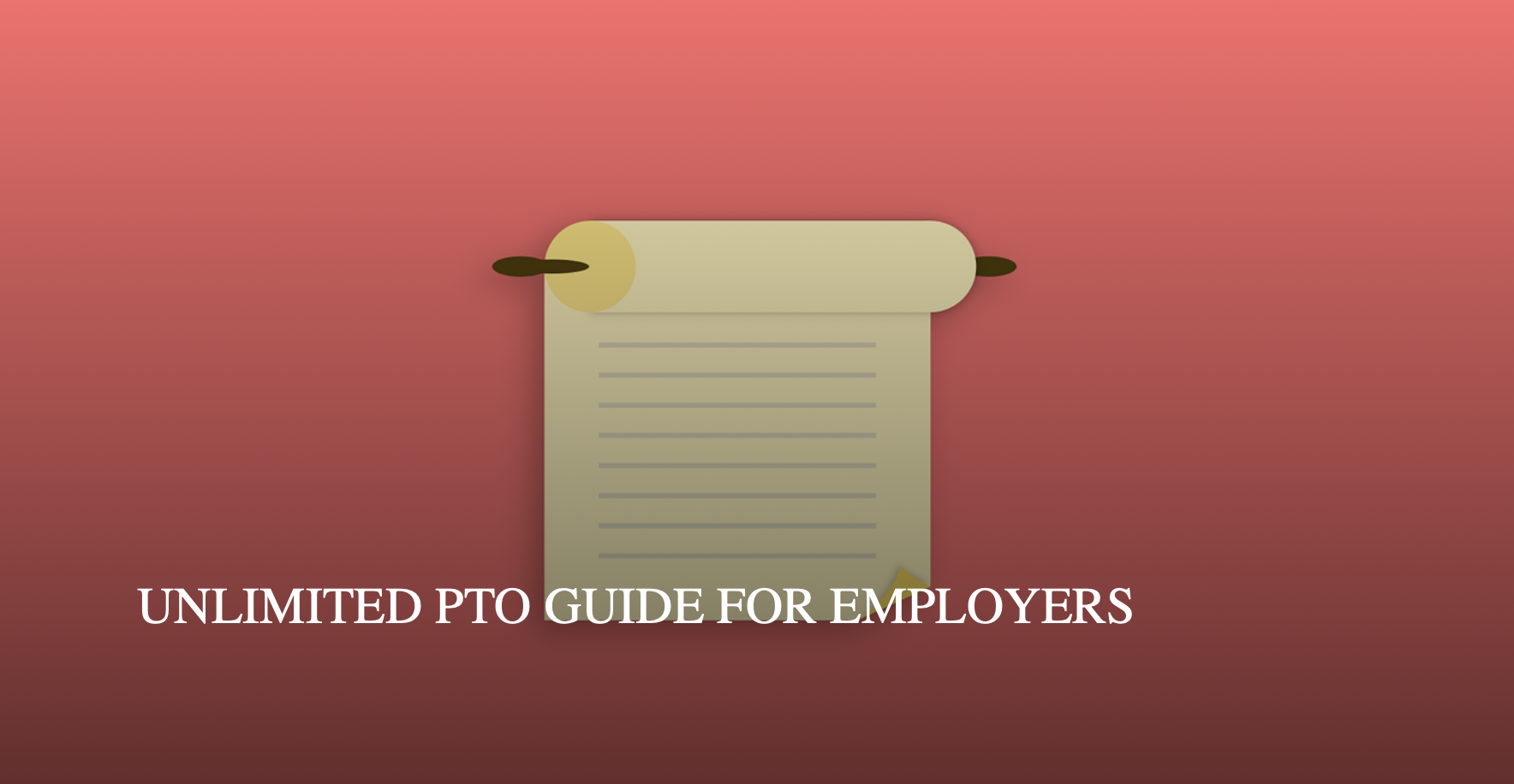Summary. A paid time off policy allows salaried or hourly employees to get paid for a set amount of time when they are not working. Parental leave, jury duty, or bereavement leave is typically not covered under a PTO policy.
A Paid time off (PTO) policy allows employees to take off for things such as vacation, sick time, or any personal time. The policy will enable a certain amount of time off to be paid hours.
In this article, we will provide a guide to what a PTO policy is and how to create one, as well as answer any questions regarding a PTO policy.
Key Takeaways:
-
A PTO policy can either provide a standard number of days for an employee to take off, or they can have an open policy and take off as many days as they want.
-
A PTO accrual policy allows employees to earn or accumulate over a period of time, meaning they can only use the amount of time that they’ve accrued so far.
-
When creating a PTO policy, you should determine the number of expected hours that must be worked to earn time off.
What Is a PTO Policy?
A PTO policy, or paid time off, is a policy that allows salaried or hourly employees to get paid partially or fully for a set amount of time when they are not working. The time spent outside of work could be on vacation, for personal days, or for sick time. Things such as new parental leave, bereavement, or jury duty are typically not covered under a PTO policy.
How to Create a PTO Policy
To create a PTO policy, you should include employee work hours, paid and unpaid leave options, and accrual and rollover policies.
-
Employee work hours. Include the number of expected business hours and number of hours that must be worked per week. The clock in/out procedure should also be included so employees are able to meet the requirements.
-
Paid and unpaid leave options. List out any paid or unpaid holidays and leave periods. This can include federal holidays, sick days, or personal days. Determine what will be considered paid and unpaid leave.
-
Accrual and rollover policy. When creating this part, determine if eligible employees are able to roll over their time off to the next calendar year. You should also determine if employees get a certain number of PTO days in a lump sum or if they accrue it throughout the year.
-
Payment upon termination. There is no federal law that requires employers to pay an employee for their accrued or unused PTO time if an employee is terminated. Since there is no federal law, there may be state PTO payout laws that you have to look out for.
-
Request procedure. Determine what the procedure is for employees calling in sick and notifying their manager of their absence. How much notice do employees need to give before their shift? How much notice for multiple days off in a row?
What Is the Standard PTO Policy for a Small Business?
The standard PTO policy for small businesses is conditional on the amount of time an employee has been with the company. Typically new employees will be allowed about ten vacation days per year and can increase the longer they work for the company.
What Is a Good PTO Policy?
A good PTO policy is granting employees 30 paid days off per year. This can be broken up by offering ten days of paid vacation, eight sick days, two personal days, plus ten paid holidays. Most PTO policies give their employees between 15 and 20 days plus any observed holidays.
What Is an Open PTO Policy?
An open PTO policy, sometimes called unlimited PTO, is when an employee has no limit on the number of vacation or sick days they can take during a year. Employees are able to take as many days off as needed throughout the year.
PTO Policy Template
PTO Guidelines:
[Company name] full-time employees, or those working over [number of hours] a week on a regular basis, can accrue one hour of paid time off for every [number of hours] worked.
Employees who are working less than [number of hours] a week on a regular basis, on-call, and temporary employees are not eligible to accrue PTO.
Paid time off hours saved must be used by the end of the calendar year and will not roll over to the next calendar year. Any remaining unused PTO hours will be paid out to employees as part of their bonuses.
Advance Notice:
Employees must notify their manager of their time off with at least [number of hours] notice of their next shift. If there are multiple days in a row that are being requested, no less than [number of days or weeks] of notice must be given.
Paid Holidays:
[Company name] operates every business day throughout the year. Employees are free to take the following holidays off without taking from their PTO.
New Year’s Day
Martin Luther King Jr. Day
Memorial Day
Independence Day
Labor Day
Thanksgiving
Christmas Eve
Christmas Day
New Year’s Eve
If an employee decides to work during one of the holidays listed above, they will receive overtime, which is 1.5 times their normal rate.
PTO Exceptions:
Exceptions to the PTO policy include any religious holidays, disability, bereavement, military leave, or jury duty. These fall under a separate policy and will not take from your PTO policy.
Payment Upon Termination:
In accordance with [name of state] state law, after [number of days] of employment, an employee will be paid upon resignation, separation, or retirement for all PTO hours accumulated but not used. Employees who dropdown under [number of hours] per week will be paid their PTO on the effective date of the change in hours.
PTO Policy Example
An example of a PTO policy:
PTO Guidelines:
Rita’s General Store’s full-time employees, or those working over 30 hours a week on a regular basis, can accrue one hour of paid time off for every 10 hours worked.
Employees who are working less than 30 hours a week on a regular basis, on-call, and temporary employees are not eligible to accrue PTO.
Paid time off hours saved must be used by the end of the calendar year and will not roll over to the next calendar year. Any remaining unused PTO hours will be paid out to employees as part of their bonuses.
Advance Notice:
Employees must notify their manager of their time off with at least one hour’s notice of their next shift. If there are multiple days in a row that are being requested, no less than two weeks of notice must be given.
Paid Holidays:
Rita’s General Store operates every business day throughout the year. Employees are free to take the following holidays off without taking from their PTO.
New Year’s Day
Martin Luther King Jr. Day
Memorial Day
Independence Day
Labor Day
Thanksgiving
Christmas Eve
Christmas Day
New Year’s Eve
If an employee decides to work during one of the holidays listed above, they will receive overtime, which is 1.5 times their normal rate.
PTO Exceptions:
Exceptions to the PTO policy include any religious holidays, disability, bereavement, military leave, or jury duty. These fall under a separate policy and will not take from your PTO policy.
Payment Upon Termination:
In accordance with California state law, after 90 days of employment, an employee will be paid upon resignation, separation, or retirement for all PTO hours accumulated but not used. Employees who drop down under 30 hours per week will be paid their PTO on the effective date of the change in hours.
What Is a PTO Cash Out Policy?
A PTO cash-out policy allows employees to have the option to cash out a portion of the PTO earned in the following year. When employees leave their job, they may be entitled to cash out. Some states have laws that classify accrued PTO as a type of wage since there is no federal law that requires employers to pay for paid time off that employees have not used.
What Is a PTO Accrual Policy?
A PTO accrual policy is a type of PTO that employees earn or accumulate over a period of time. This means employees can only use the amount of time that they’ve accrued so far. This policy will state if the accrued PTO will expire at the end of a calendar year or if it may roll over. It will also state if an employee will be paid for accrued but unused time if they resign.
What Is a Negative PTO Policy?
A negative PTO policy is when an employee takes time off before they can accrue it. This means that an employer loans their employee the salary to cover the paid time off. The employee can pay back this loan by occurring the necessary time until the loan is covered. Or the employer can deduct the time through a voluntary wage deduction until it is paid back.
What Is a Flexible PTO Policy?
A flexible PTO policy gives employees an unlimited amount of PTO days. Typically in this type of policy, employees do not have to earn or accrue the time they decide to take off. Employees may be able to use this time off for vacation, sick leave, or other reasons that would cause them to miss work.
What Is a Use It Or Lose It PTO Policy?
Use it or lose it PTO policy is when an employee loses their PTO if they do not use it within a specific time frame. This can apply to different types of time off, such as vacation or sick leave. There is no federal law that requires mandatory paid time off, but each state will have different laws regarding paid time off policies.
What Is a PTO Donation Policy?
A PTO donation policy allows employees to donate their unused time to their colleagues or coworkers who may need paid time off but do not have it. Some organizations do not allow employees to donate their entire unused time and will require them to keep a minimum number of hours.
How to Make a PTO Policy For Hourly Employees
A PTO policy for hourly employees should be similar to a regular PTO policy, but it should be determined how the number of hours the employee works. For example, an employee can earn one PTO hour for every 40 hours worked. That means if the employee worked 1,600 hours in a year, they would earn 40 hours of PTO.





